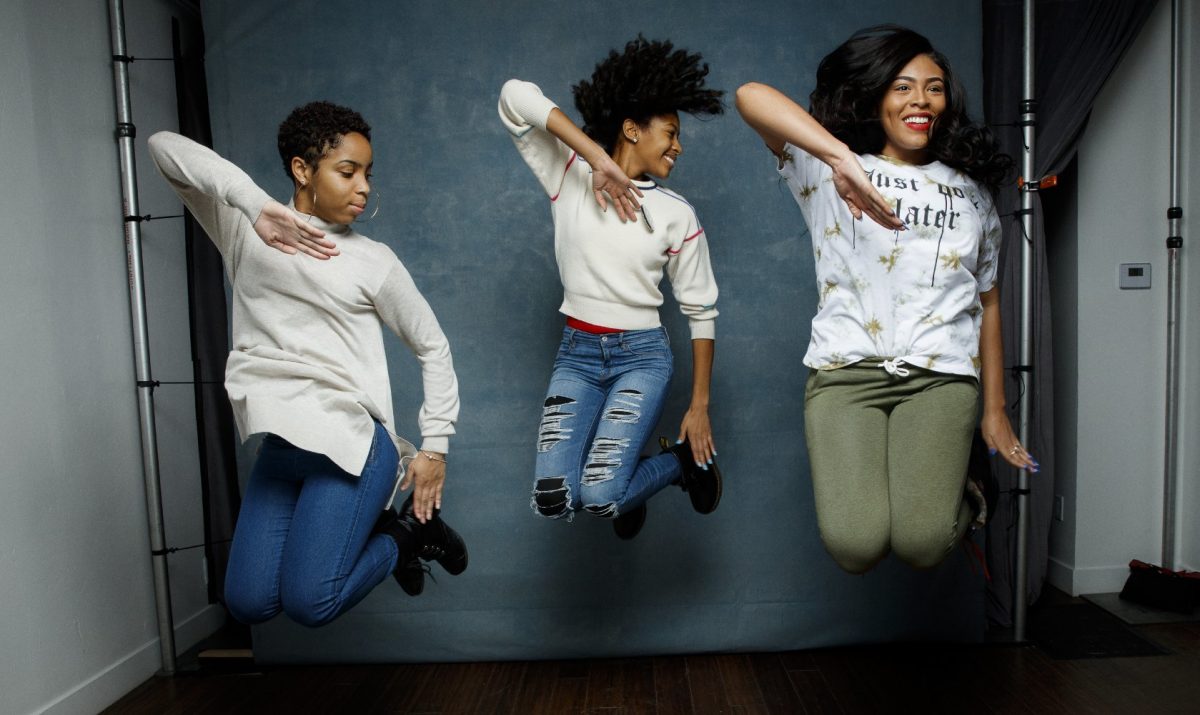
When Baltimore native and Broadway producer Amanda Lipitz set out to create a documentary about a local step team, she had no idea what the year 2015 would mean for the city.
But her new film, Step, follows the lives of three girls at the Baltimore Leadership School for Young Women (BLSYW) in the aftermath of the Freddie Gray Uprising.
This inspirational story follows Blessin Giraldo, Cori Grainger, and Tayla Solomon during their senior year of high school. The audience is invited on their journey of familial, academic, and social stress—and what that could mean for their future.
The girls were in town for the premiere Monday night at the Parkway Theatre, so we sat down to with them to learn more about how the project emerged.
Amanda tells us that Blessin was the catalyst for the film.
Blessin Giraldo: Amanda has been involved in our school culture a lot; she’s the daughter of one of the founders. She does videos for us to help us raise money for our education. She loves girls that are first-generation students going to college, so I figured the worst thing she could say was “no,” so I asked her if she could film the step team, and now we have a movie.
How did you get involved with step and when did the step team begin?
BG: My first time seeing step was at Morgan State University. I was in fifth grade transitioning into sixth grade—I fell in love. I went home, went on YouTube and taught myself how to do it. But I knew nothing about its rich culture, I learned that later on in life. I brought the idea to my sisters and the principal at BLSYW and they all trusted me to do a super cool step team.
Cori Grainger: Step helped me to express myself in a way that I wasn’t comfortable doing before. I started when Blessin started it in the sixth grade. I am usually quiet, but when I step, I become a different person that is more confident.
Tayla Solomon: Cori is like a quiet storm. I started in the ninth grade.
There are 19 girls on the step team, but only three of you were chosen to be the focus of the film. How did that happen?
BG: A lot of us have similar stories. That’s how we relate to one another so much. I think Amanda picked one out of a group of girls with similar stories that was more open to sharing their story.
TS: Some girls didn’t want their lives documented; it’s all about what you’re comfortable with. The first time watching the film, it wasn’t easy. Some parts we were embarrassed about, but few months later, I was no longer embarrassed because I learned from it, and grew, and progressed.
BG: It wasn’t exploitation; it was far from that. It was about being courageous and confident enough to be an example to other young men and women around the world who can relate to your story—being an example for your generation.
At one point it seemed like everyone was hanging out without Blessin. Was that an accurate portrayal?
BG: That was a specific moment in my life when I isolated myself. Even if there was a problem, the other girls would come to me after a practice and be like, ‘You good?’ It was never that type of vibe where it was just me and then the team. That was just a temporary phase that we went through, which is a part of our bigger story. We get over those things—I do love being with my team. That’s why at the end of the movie I say, ‘They don’t know how much they mean to me.’
There were some tough times for you all that year, moments of vulnerability. Was it difficult having your every move documented?
CG: I wouldn’t say it was that hard actually. Since it’s a documentary, you just have to be yourself and live your normal life. The hardest part was probably the fact that sometimes you don’t understand why the cameras have to be there at this specific scene or time, and you just want them gone. But it’s a part of your story and it’s something that you want the people to know. We put away our own feelings to actually think about what we want people to learn from this experience.
TS: It really felt like the cameras weren’t even there. We had a great camera crew, I love them, and they love us. We definitely created a bond with them; everything just flowed naturally.
BG: There was over 400 hours of footage, and the film is only 83 minutes. There are a lot of different layers to us, and this doc is just one layer.
What was something that didn’t make it in the film that you wish had?
BG: Prom. I also started a talk show for the education channel 77 here in Baltimore, “Teen Talk Speak Up.” I was the host for the entire year, they followed me there, I wrote stories about it for BLSYW. It was a huge accomplishment for me.
CG: For me, the documentary shows a lot of strength from our mothers and females in our lives who are there to be our role models. But a lot of us actually do have father figures in our lives, and I just wish my dad were represented more. My stepdad is in it a few times, but I also have a father who is amazing, and very supportive, and we’re very close.
TS: I would have liked for the scenes that we hang out outside of step to have been shown. We talk about sisterhood in the movie, but it’s not really shown.
The film chronicles your senior year of high school. At the end of the film, you are all off to college, are you still where the film left off?
CG: Well I dropped out of school.
TS: Yea, pretty much.
BG: Yea, me too.
TS: After the documentary, it was like what’s the point.
CG: It’s like we’re famous now, so who cares.
BG: We’re kidding! [Laughs] I worked really hard to get there, why would I drop out?
CG: We’ll all be [college] sophomores in the fall.
The film opens nationwide on August 4. What do you want audiences to take from your story?
CG: We want people to see that we all go through things, but you have to set a goal and focus on what’s important to you. You have to find people who support you to accomplish those goals. Anything is possible.
TS: To take advantage of every opportunity that comes your way. To be a support system to someone, and have your own support system, because some people don’t understand that there are people that want you to be successful. You also have to be able to accept tough love and take the criticism; someone sees potential in you, and wants to help you become a better person.
BG: To be resilient, and to try no matter what the odds are. It’s about what you expect from yourself, that’s something that kept me going—envisioning who I wanted to be. I want people to know that no matter what you go through, there will be a light at the end of that journey. There will be rainbows after that storm; you just have to respect the process and the progress.
